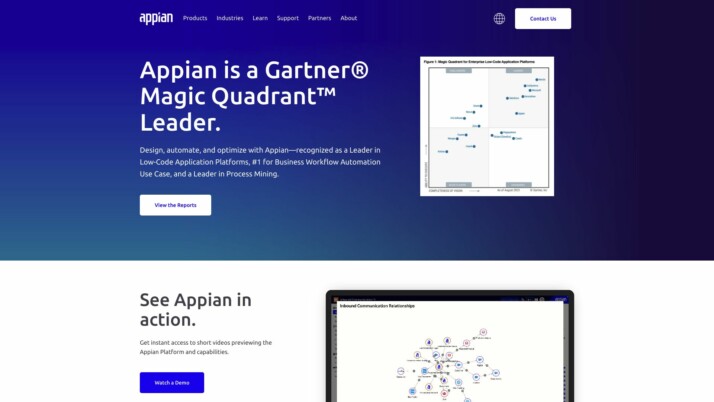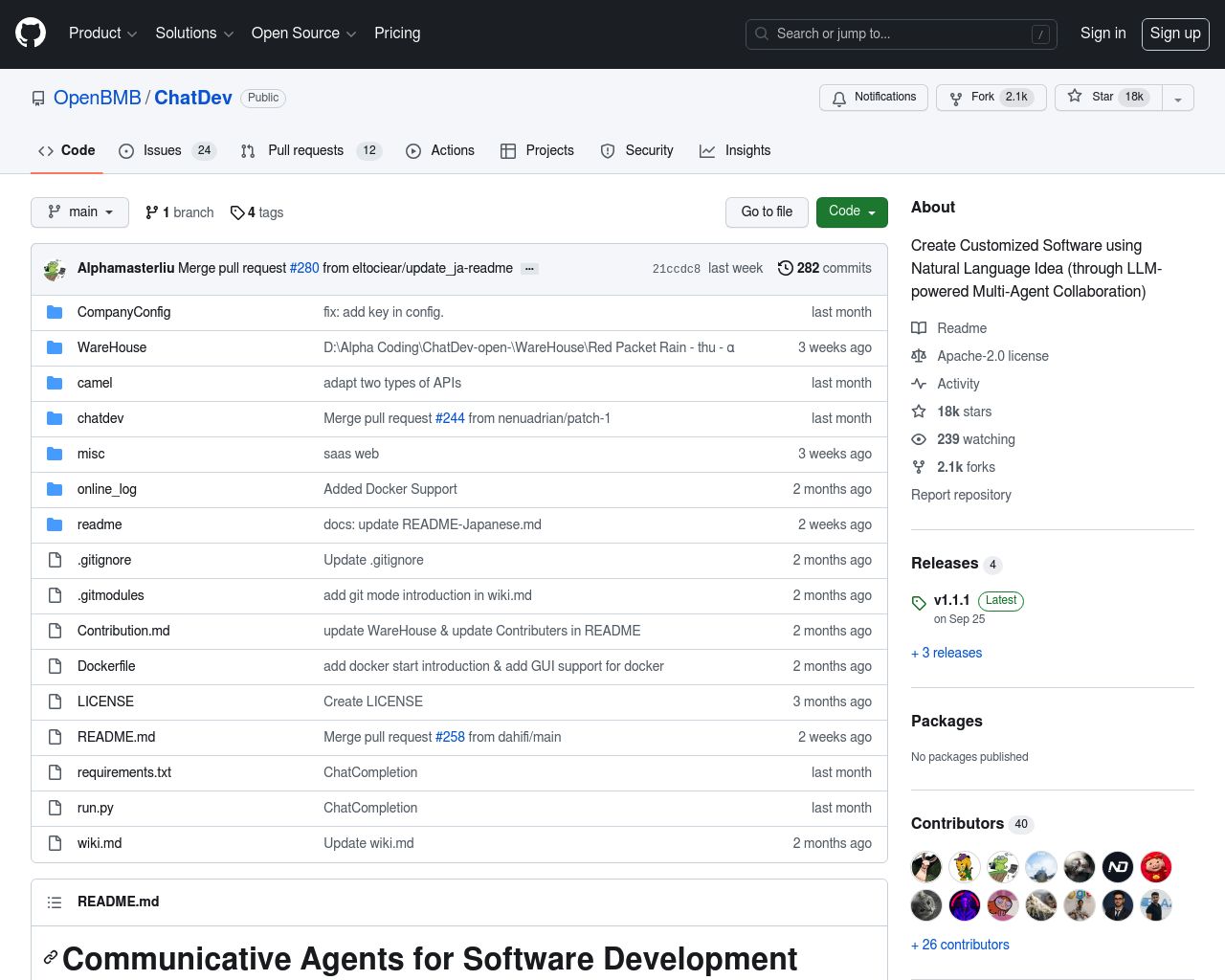Appian vs. ChatDev: AI-Powered Development Platforms Compared
AI-powered software development tools are transforming how businesses create and deploy applications. This review compares Appian’s low-code AI platform with ChatDev’s innovative multi-agent framework, showcasing their unique approaches to streamlining development processes. We explore how these platforms tackle AI integration, automation, and collaborative development, highlighting their strengths and limitations.
By examining key features, security measures, and deployment options, we provide insights to help technical teams, business leaders, and AI enthusiasts make informed decisions about which solution best fits their needs. Our analysis also introduces SmythOS, a comprehensive platform that combines the strengths of both approaches while addressing their shortcomings, offering a powerful alternative for those seeking advanced AI capabilities with seamless workflow integration.
Appian Overview
Appian transforms businesses through its powerful low-code AI platform. This innovative tool enables organizations to rapidly develop and deploy intelligent applications without extensive coding expertise.


Appian’s AI capabilities seamlessly integrate with existing workflows, automating complex processes and enhancing decision-making. The platform excels in document processing, email classification, and data extraction, leveraging advanced AI to streamline operations across industries. Its low-code approach democratizes AI development, allowing both technical and non-technical users to create sophisticated AI-powered solutions.
Appian’s AI capabilities seamlessly integrate with existing workflows, automating complex processes and enhancing decision-making. The platform excels in document processing, email classification, and data extraction…
Security and compliance form the bedrock of Appian’s offering. The platform ensures data privacy and adheres to stringent regulatory standards, making it ideal for industries handling sensitive information. Appian’s commitment to transparency manifests in its AI models, which provide detailed explanations and confidence scores for extracted data.
Appian’s scalability accommodates growing business needs, from small-scale projects to enterprise-wide deployments. The platform’s visual builders and pre-built AI skills accelerate development cycles, reducing time-to-market for AI-driven applications. While Appian excels in process automation and data processing, it may have limitations in areas like multi-agent collaboration or advanced natural language understanding compared to specialized AI platforms.
Integration capabilities stand out as a key strength, with Appian supporting connections to various APIs and robotic process automation (RPA) tools. This flexibility allows businesses to incorporate AI into their existing technology stack seamlessly. However, users seeking extensive customization options for AI models may find the platform’s offerings somewhat constrained.
ChatDev Overview
ChatDev revolutionizes software development by automating the entire process using large language models (LLMs). This open-source framework simulates a virtual software company where intelligent agents collaborate to create software solutions rapidly and cost-effectively.


ChatDev employs a multi-agent system to mimic roles typically found in a software development company. These agents, including a CEO, CTO, programmer, tester, and art designer, communicate through a structured chat chain to break down complex tasks into manageable steps. This innovative approach enables ChatDev to deliver complete software applications, including source code, user manuals, and environmental dependencies, in remarkably short timeframes.
ChatDev can develop a simple game in under seven minutes for less than one dollar. It leverages advanced features like thought instructions and self-reflection to minimize errors and improve code quality.
The platform stands out for its ability to generate entire software projects in minutes at a fraction of traditional costs. For instance, ChatDev can develop a simple game in under seven minutes for less than one dollar. It leverages advanced features like thought instructions and self-reflection to minimize errors and improve code quality. Additionally, ChatDev supports Git for version control, enabling collaborative and concurrent development practices.
While ChatDev offers impressive capabilities, it faces challenges common to AI-driven development tools. These include potential limitations in handling highly complex or specialized software requirements and the need for human oversight to ensure optimal results. The platform’s reliance on LLMs also raises questions about the consistency and reliability of generated code across different projects.
Despite these considerations, ChatDev represents a significant step forward in AI-assisted software development. Its ability to automate the entire development lifecycle, from initial design to final product, positions it as a valuable tool for developers and companies seeking to streamline their software creation processes and reduce time-to-market for new applications.
Feature Comparison
Appian and ChatDev offer distinct approaches to AI-powered software development, each with its own strengths and limitations. Appian excels in low-code AI integration and process automation, while ChatDev focuses on simulating a full software development lifecycle using AI agents.
Appian’s low-code platform enables rapid development of AI-enhanced applications without extensive coding expertise. It provides pre-built AI capabilities for tasks like document processing and email classification, making it accessible to users with varying technical backgrounds. However, Appian lacks some advanced AI features like autonomous agents, multi-agent collaboration, and extensive customization options for AI models.
ChatDev, on the other hand, leverages large language models to automate the entire software development process. Its multi-agent system simulates roles like CEO, programmer, and tester, enabling rapid creation of complete software applications. While this approach offers impressive speed and cost-efficiency, it may struggle with highly complex or specialized software requirements that demand human expertise.
In terms of security and deployment, Appian emphasizes data privacy and regulatory compliance, making it suitable for industries handling sensitive information. ChatDev’s open-source nature provides flexibility but may require additional measures to ensure enterprise-grade security. Both platforms support version control, with Appian integrating various APIs and ChatDev utilizing Git for collaborative development.
We at SmythOS offer a comprehensive solution that combines the strengths of both approaches. Our platform provides intuitive visual builders for easy AI development, supports multi-agent collaboration, and ensures enterprise-grade security. With SmythOS, users can create sophisticated AI agents that seamlessly integrate into existing workflows while maintaining full control over their data and deployment options.
Feature Comparison Table
| Appian | ChatDev | SmythOS | |
|---|---|---|---|
| CORE FEATURES | |||
| Hosted Agents (Dev, Production) | ❌ | ✅ | ✅ |
| Visual Builder | ✅ | ❌ | ✅ |
| No-Code Options | ✅ | ❌ | ✅ |
| Autonomous Agents | ❌ | ✅ | ✅ |
| Multi-Agent Collaboration | ❌ | ✅ | ✅ |
| Bulk Work | ✅ | ❌ | ✅ |
| Agent Work Scheduler | ❌ | ❌ | ✅ |
| SECURITY | |||
| Constrained Alignment | ✅ | ❌ | ✅ |
| IP Control | ✅ | ❌ | ✅ |
| COMPONENTS | |||
| Foundation AIs | ❌ | ✅ | ✅ |
| Huggingface AIs | ❌ | ✅ | ✅ |
| Zapier APIs | ❌ | ✅ | ✅ |
| Data Lakes | ✅ | ❌ | ✅ |
| DEPLOYMENT OPTIONS (EMBODIMENTS) | |||
| Staging Domains | ✅ | ❌ | ✅ |
| Production Domains | ✅ | ❌ | ✅ |
| Deploy as Site Chat | ❌ | ✅ | ✅ |
| Deploy as Scheduled Agent | ❌ | ❌ | ✅ |
| Deploy as GPT | ❌ | ✅ | ✅ |
| Scalability | ✅ | ❌ | ✅ |
| DATA LAKE SUPPORT | |||
| Hosted Vector Database | ❌ | ❌ | ✅ |
| Sitemap Crawler | ❌ | ❌ | ✅ |
| YouTube Transcript Crawler | ❌ | ❌ | ✅ |
| URL Crawler | ❌ | ✅ | ✅ |
| TXT File Support | ✅ | ❌ | ✅ |
Best Alternative to Appian and ChatDev
SmythOS stands out as the superior alternative to Appian and ChatDev, offering a comprehensive platform for AI agent development and deployment. We combine the strengths of low-code accessibility with advanced AI capabilities, providing a solution that caters to both technical and non-technical users.
Our visual builder simplifies the creation of sophisticated AI workflows, allowing users to design and deploy agents without extensive coding knowledge. This approach democratizes AI development, making it accessible to a broader audience while still providing the depth and flexibility required by experienced developers.
SmythOS offers a versatile platform for creating autonomous agents capable of handling a wide range of tasks. Our multi-agent collaboration feature enables the development of complex AI systems that can work together seamlessly…
Unlike Appian’s limited AI features or ChatDev’s focus on simulating software development, SmythOS offers a versatile platform for creating autonomous agents capable of handling a wide range of tasks. Our multi-agent collaboration feature enables the development of complex AI systems that can work together seamlessly, surpassing the capabilities of both Appian and ChatDev.
Security and scalability are paramount in SmythOS. We provide enterprise-grade security measures, including data encryption and IP control, ensuring that your AI solutions meet the most stringent compliance requirements. Our platform scales effortlessly to meet growing demands, supporting everything from small-scale projects to large enterprise deployments.
With SmythOS, users gain access to a rich ecosystem of integrations, including support for various AI models, APIs, and data sources. This flexibility allows for the creation of highly customized AI solutions that can easily integrate into existing workflows and systems, addressing a wide range of business needs more effectively than either Appian or ChatDev can offer.
Conclusion
Appian and ChatDev offer unique approaches to AI-powered software development, each with distinct strengths. Appian’s low-code platform excels in process automation and AI integration, making it accessible to users with varying technical expertise. ChatDev’s innovative use of AI agents to simulate a full development team showcases the potential for rapid, cost-effective software creation.
However, SmythOS emerges as the superior choice, combining the best aspects of both platforms while addressing their limitations. Our platform provides an intuitive visual builder for easy AI development, supports multi-agent collaboration, and ensures enterprise-grade security. With SmythOS, users can create sophisticated AI agents that seamlessly integrate into existing workflows while maintaining full control over their data and deployment options.
SmythOS stands out with its extensive integration ecosystem, supporting over 300,000 integrations and a wide range of AI models. Our “Create Once, Deploy Anywhere” approach allows for unparalleled flexibility, enabling users to deploy AI agents across various platforms and services with ease. From chatbots to APIs, SmythOS empowers businesses to harness the full potential of AI across their operations.
To experience the power of SmythOS for yourself, we invite you to explore our diverse range of AI-powered agent templates and create a free SmythOS account. Discover how our platform can revolutionize your workflow, boost productivity, and unlock new possibilities in AI-driven software development. Join us in shaping the future of AI integration and automation – get started with SmythOS today.
Last updated:
Disclaimer: The information presented in this article is for general informational purposes only and is provided as is. While we strive to keep the content up-to-date and accurate, we make no representations or warranties of any kind, express or implied, about the completeness, accuracy, reliability, suitability, or availability of the information contained in this article.
Any reliance you place on such information is strictly at your own risk. We reserve the right to make additions, deletions, or modifications to the contents of this article at any time without prior notice.
In no event will we be liable for any loss or damage including without limitation, indirect or consequential loss or damage, or any loss or damage whatsoever arising from loss of data, profits, or any other loss not specified herein arising out of, or in connection with, the use of this article.
Despite our best efforts, this article may contain oversights, errors, or omissions. If you notice any inaccuracies or have concerns about the content, please report them through our content feedback form. Your input helps us maintain the quality and reliability of our information.
